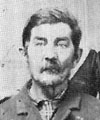Born: Died:
|
John Brown "Grub" HudsonJohn Brown Hudson, the oldest son of Thomas Croucher and Elizabeth Hudson, was born on March 8, 1838, in Yellville, Arkansas (Marion County). He married Minerva Carney on July 28, 1859. Seven children are known to have been born to this union: Thomas Calvin, Clarica Elizabeth, John David, Isaac Jacob, Tennessee, Samuel, and Mariah Ann. Samuel and Tennessee died while young children in Texas. At the start of the Civil War, John Brown Hudson enlisted in the Arkansas Cavalry and served during the entire war, taking part in many minor engagements and a few real battles. He was noted in his company as a joker and always careless about his equipment. Anything that would hold together was good enough for him and many times he had no bridle for his horse. At Fayetteville, Arkansas, year 1862, his company was ordered to take the town from the Confederate force. As usual, when orders came, Hudson could not find his bridle so he rigged up one by taking a cast of headstall and making a bit out of a piece of rope. He was ready when the command was given to "fall in". When they had come close to the town, a charge was ordered and the company went full speed into the town to find it occupied by a larger force than had been reported. The commanding officer ordered a halt but Hudson's horse had chewed his bit in two and was running at full speed into the camp. Therefore, he was captured. When camp was pitched that night he entertained his captors with funny stories and queer antics until they were convinced he was crazy and gave him his freedom on the promise not to fight against them further. The promise held good until he could get out of reach and make it back to his company. (How he acquired the name, Grub Hudson). Being a "fiddler", he quite naturally took to all the dances held in the vicinity of the soldiers camp. It was at one of these dances that he acquired the name, Grub Hudson, which he carried the rest of his life and by which he was familiarly known by thousands of people. It is reported that he, and others of his company, slipped away without permission to attend a neighborhood dance. As soon as their absence was noted, a non-commissioned officer was sent to look for them. The officer found them at a dance and Hudson was playing the fiddle. The officer secured the names of the others, who gave their correct names. Then he asked Hudson's name. As chance for a joke, Hudson gave the name of John Grub, another member of the company, who was peacefully sleeping in the camp. As a result, Grub was called on the carpet, while Hudson went his way, tormenting others. After the war, when he had received his discharge, he settled in Carroll County, Arkansas, for a time and then moved to Barry County, Missouri, about 1906. He was residing on Carney Branch, near the Flat Creek post office, when he lost his foot by catching it under a tree that he had felled. He was over a mile from home at the time, and to free himself, he chopped his foot off and crawled home. The amputation, made necessary by the accident, was not entirely satisfactory and the wound never healed. He made himself a wooden leg and walked on it for thirty years. Shortly after the accident, he moved his family on a homestead and with the help of his neighbors, he built a log house on the side of a hill in Baptist Holler, about two miles from the main road. There was a spring above the house and he piped the water to the house through a homemade trough. All they had to do was to dip a bucket into the cedar tub. That was considered modern in 1899 or 1900, especially in that neighborhood. He and his boys also built a blacksmith shop and a carpenter shop. John (Grub) Hudson, being handy with tools, made himself a coffin out of cedar. He had an idea that he would die on his fifty-fifth birthday. The birthday came and the years passed on; still he lived. His aged father, who made his home with him, fell ill and died and the casket was used to put him away. Another coffin was made and set aside for the day that was sure to come. Years came and went, then a neighbor lady, of a poor family, died. This second coffin was used for her. The third was immediately begun, finished and set aside. For several years it sat in his workshop and was used to store beans and black walnuts. On September 29, 1917, John Brown (Grub) Hudson died of an infection of his foot that never healed. He was buried at Carney Cemetery, near the community of Flat Creek, Missouri (Barry County).
|
